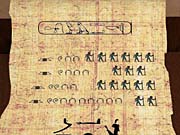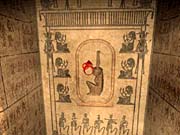Alan P. Cameron may be the first computer game hero with type-VI male-pattern balding. When he takes off his fedora, revealing that his visible fiery red hair is, in reality, just a little islet on his otherwise smooth horizon, it's an honestly surprising moment. But it's the only surprise in The Cameron Files: Pharaoh's Curse. Apart from the hero's hairline, Pharaoh's Curse is a paint-by-numbers adventure game, lifting its premise--and even some of its puzzles--from countless similar games that have preceded it.

That Pharaoh's Curse has an Egyptian theme is probably obvious, given the title. But it probably wouldn't be a surprise anyway, considering that Egypt is in a three-way-tie with Atlantis and mysteriously abandoned space stations for uninspired adventure game premises. You play as Alan P. Cameron, a private investigator who borrowed his first name from Alan Quartermain, his hat from Indiana Jones, and, apparently, his concept of a private investigator from both of them. Cameron has been hired to investigate an archeological dig in Egypt, where he faces plenty of Nazis and locked doors along the way.
Without so much as an explanation, Pharaoh's Curse drops you in the courtyard of a hotel at the beginning of the game. Inside you'll find a bronze-colored receptionist, whose skin tone is frighteningly identical to the decorative artifacts nearby. Whenever his hand moves in front of something, it vanishes. Many of the characters--such as Edmond, the sand-colored Frenchman--share the receptionist's natural camouflage. This may be helpful when dealing with Nazis and mummies, but it looks terrible.
The rest of the game doesn't look much better. Exploring the inside of a museum, you're treated to bland artifacts that look even worse given the game's unchangeable 640x480 resolution. Everything is washed out and pixelated, and character models are mostly without character. One model is even used twice, though the game jokes away its recycling by explaining that the characters are twins.
You move about the world with the standard node-to-node movement system found in many adventure games. But the nodes are confusing at best. Oftentimes you'll take a small step, other times a huge leap. You'll walk down a lengthy hallway in one or two clicks, passing numerous doors that you don't even get to attempt to open. It's easy to pass by a possible exit simply because you'll think it's just another decorative door.
It's also easy to miss important objects. Pharaoh's Curse features some of the most obtuse pixel hunting ever seen in an adventure game. Objects you need are often well hidden behind other objects that just look like decor. And what's worse, hard-to-find objects will often appear in places you've already searched after you've already searched them. Something will "trigger" the item, meaning an almost-impossible-to-spot key is now lying on the floor of a room you just spent a few minutes combing with your mouse. Having to search every visible area with your mouse is bad enough, but having to go back to places you've already scoured and repeat the process is just sadistic.
Most of the puzzles revolve around finding and retrieving keys, so you can open hotel rooms, boat cabins, or monolithic doors in a temple. The game even steals the "get the key from the locked door" puzzle that originated in Zork II and has been used and reused dozens of times since. Pharaoh's Curse also features one of the cruelest mazes ever devised, requiring you to navigate a poison-gas-filled room using only a scuba mask and a hieroglyphic key. How a scuba mask saves you from poison gas, however, must be a secret of the ancients.

The Egyptian setting allows for plenty of hieroglyphic puzzles, though these are somewhat easy if you learn to look for clues in the numerous textbooks lying around. Fans of timed puzzles are in luck, because Pharaoh's Curse has quite a few. These puzzles are mostly easy, requiring only that you find somewhere to hide, though the game's poor interface occasionally makes them unnecessarily difficult, so you have to try and try again as you search for some nook or hidden path you haven't seen before.
Those who just want to do nothing more than solve puzzles will possibly find some pleasant distraction in Pharaoh's Curse's challenges. But compared to the handful of great adventure games we've seen in the last few years, Pharaoh's Curse is just a bunch of tired mechanics and uninspired puzzles wrapped in unappealing rags.